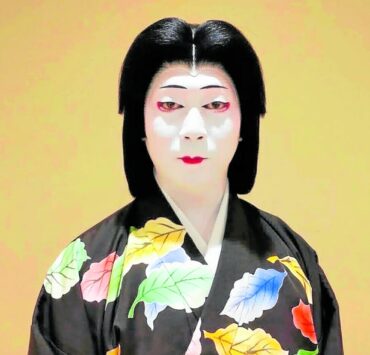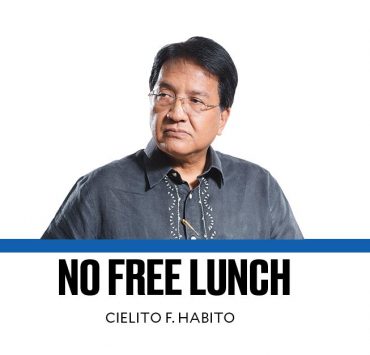This dry goods store is a custodian of heritage
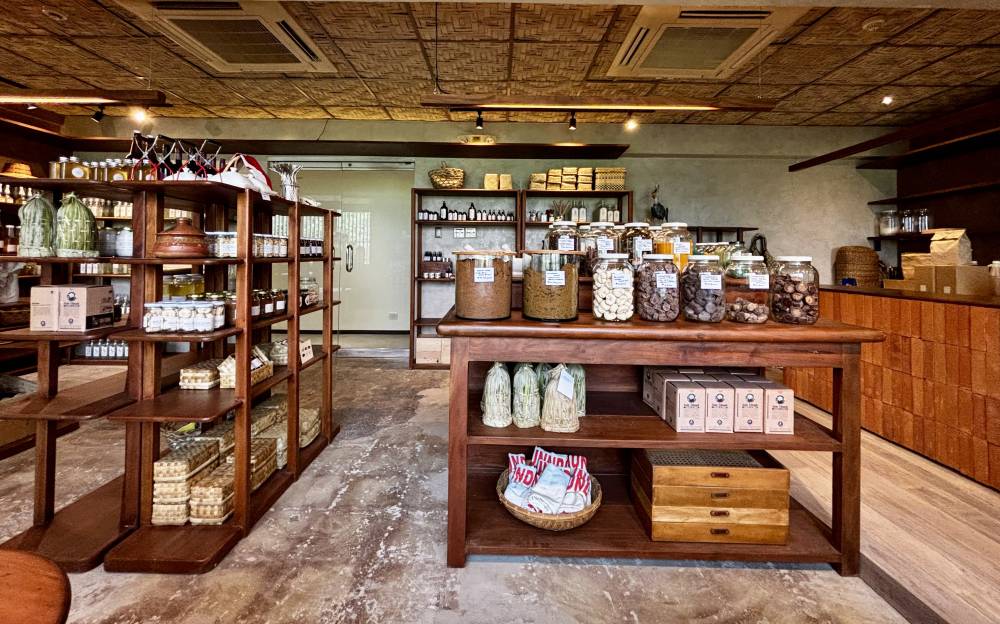
Between obscurity and rediscovery, Bea Misa-Crisostomo stands as an important figure, bridging the past and present of Philippine food and heritage. As the visionary behind Ritual, a pioneering sustainable general store, she embarks on journeys to the archipelago’s remote corners, unearthing forgotten herbs and spices steeped in tradition.
Her mission is crucial: Each unique ingredient she rediscovers risks vanishing if it fails to reach a wider market.
Driven by an idea, Crisostomo researches each potential find—delving into antique cookbooks, historical documents, firsthand exploration, and conversations with local producers. When investigating a plant, she examines its traditional uses across diverse tropical cultures globally to understand its broader potential beyond the immediate Philippine context. Her research extends to historical records, seeking indigenous names and their historical and scientific contexts.
Her research led her to an old family sales book from the turn of the 20th century, detailing a general store’s operations before modern groceries. This concept, akin to Ritual, saw goods primarily sourced from microentrepreneurs. Ritual modernizes this idea, offering a diverse range of products, often sold in small quantities (tingi) and without plastic packaging, similar to provincial market offerings.
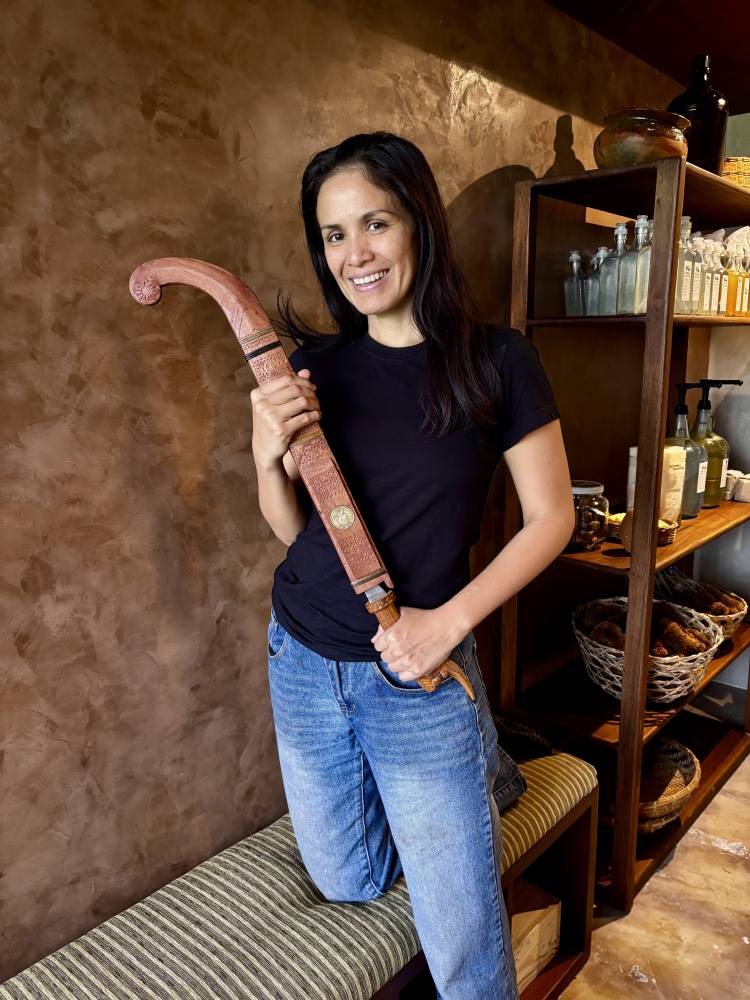
Ritual operates under Crisostomo’s company, Lazy Natives, a name that challenges historical misconceptions. She explains that the Spanish, upon arriving and seeing a landscape unlike European farms, mistakenly labeled the indigenous people as lazy, failing to recognize the abundance of natural resources that readily provided sustenance. The Spaniards later understood the environment’s capacity to support a larger population.
Established in 2010 at the defunct The Collective in San Antonio Village, Ritual became known for its organic soaps and cleaners, formulated by Crisostomo with a chemist, alongside dry commodities. The sustainable store later moved to Arnaiz Avenue until the pandemic prompted a temporary shift.
Crisostomo relocated to her hometown, Dumaguete, establishing another Ritual store. In Makati, Ritual transitioned online and maintained a presence with a stall of organic toiletries and household supplies at the Legazpi Sunday Market.
Artisanal products
Now, Ritual has returned to Makati with a physical store at Karrivin Studios on Chino Roces Extension, continuing its mission to promote goods from artisans in the provinces. One shelf showcases a variety of sugars, including coconut sugar from Davao de Oro, muscovado from Cabancalan, Negros Occidental, balikucha (sugarcane candy) from Candon, Ilocos Sur, and kaong (sugar palm) sugar from Negros Oriental.
Chocolate enthusiasts will discover unsweetened tablea from Negros, Davao, and Siquijor, alongside turmeric from Negros, spirulina from Batangas, and forest coffee beans from protected areas of Negros. Jars filled with fragrant cinnamon bark and leaves offer a sweet, peppery, and woody aroma. The Philippines has over 19 cinnamon species, with leaves traditionally used in such dishes as humba, adobo, and biko. These cinnamon leaves differ from laurel leaves, though they can serve a similar culinary purpose.
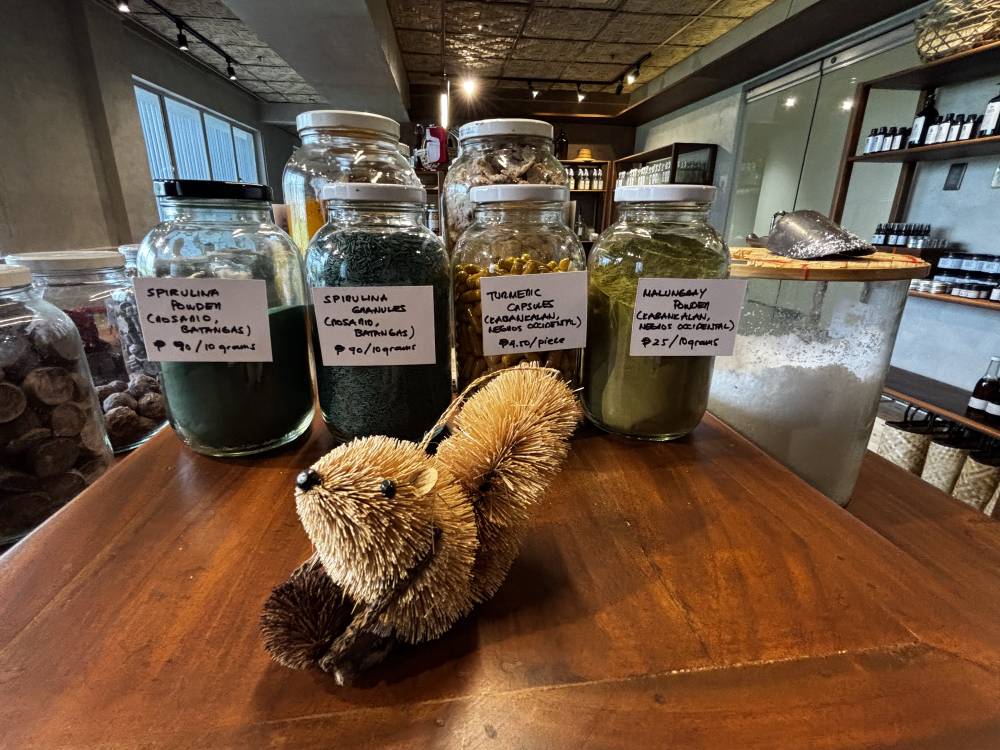
Ritual has long been recognized for its diverse salt selection, featuring sea salts from Botolan, Zambales, solid salts from Guimaras, the savory asin tultul, and the smoky asin tibuok. Buri starch, or landang, provides a versatile ingredient for such dishes as dinuldol (coconut pudding) and binignit (sweet dessert soup), offering an alternative to tapioca starch.
Soybeans hail from Kanlaon in Negros Island, while Maguindanao contributes seaweeds and the flavorful palapa, a condiment made from coconut milk and alliums. Benguet offers bignay wine and tapuy (rice wine), and Aklan and Quezon provide lambanog (palm liquor), various vinegars, and coconut aminos, a gluten-free soy sauce substitute. Nika, a starch derived from the nipa palm, originates from Maguindanao, adding to Ritual’s collection of artisanal commodities from remote regions.
Piecemeal
“Salt is currently our top seller, but sometimes we see a surge in orders for something else, often sparked by a celebrity post, much to our surprise,” Crisostomo says. Nipa vinegar from Negros and Infanta, Quezon, has recently gained popularity.
Crisostomo explains the direct sourcing model: “For example, the tablea, we get it in bulk, so we have to count each piece, and when we sell it, it’s also per piece. The operations are more meticulous as we don’t deal with distributors. We receive raw products and handle the packing and weighing ourselves.” This necessitates ample storage space.
“It’s a lot of work, but it’s fun for us,” she adds. “We’re selling heritage, diversity, and access.” Ritual also prioritizes offering products in affordable quantities, a practice learned from her father’s general store, catering to the demand for the tingi, especially among Manila’s migrant communities. “Tablea is quite popular even in urban poor areas,” Crisostomo notes.
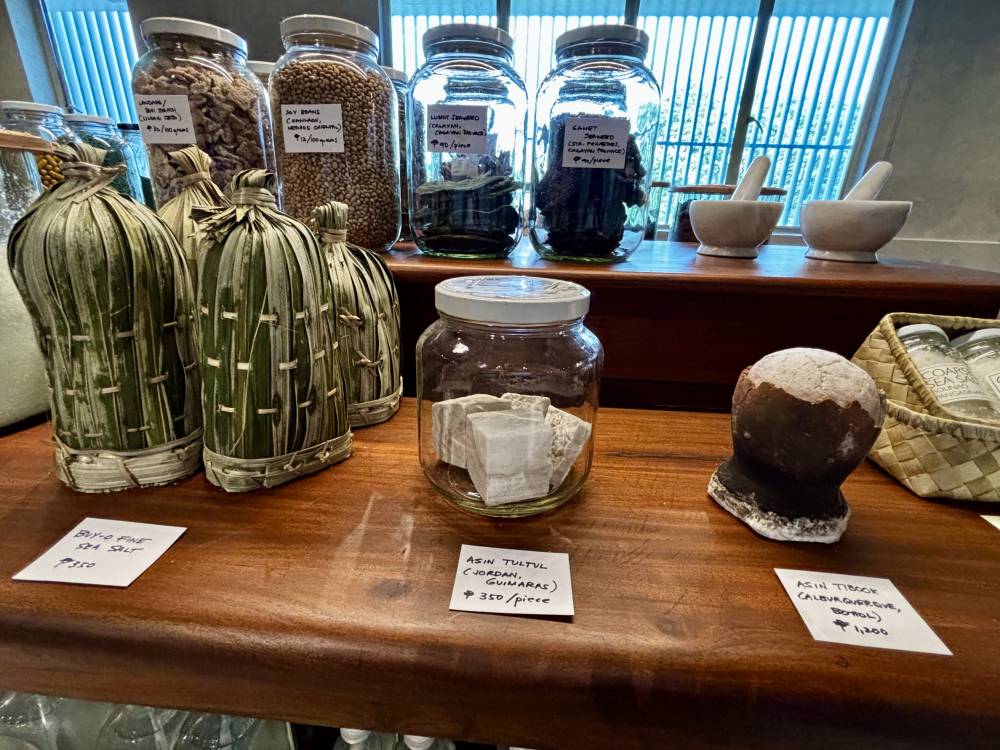
To promote local craftsmanship, Ritual offers hand-carved machetes from the Panay-Bukidnon tribe. Liquid soaps remain popular, available in orange, rosemary, lavender, lemongrass, and pepper variants. During Christmas, gift boxes of lavender and lemongrass soaps are highly sought after. From Dumaguete, virgin coconut oil soaps incorporate forest plants traditionally used to soothe skin conditions among Bilibid prisoners. Crisostomo, an enthusiast of medicinal plants with certification from Formula Botanica, incorporates these botanicals into Ritual’s essential oils, insect repellants, and shampoos. Makabuhay, madre de cacao, guava, and neem are transformed into balms.
Crisostomo recalls the initial isolation of her research, now buoyed by the emergence of other heritage proponents such as the online archive Lokalpedia, FEATR documentaries by content creator Erwan Heussaff, and the Legazpi Sunday Market.
Reintroducing
Looking ahead, Ritual plans to feature guest producers, particularly for coffee. “During the pandemic, we had to stop carrying most of the jams and sauces from other producers due to low margins and their strong online presence,” Crisostomo explains. “But with our new physical storefront now attracting more customers, it makes sense to reintroduce these local products.”
Two shelves will be dedicated to these jams, including starfruit, catlon, and tomato from Negros, with guava and mulberry varieties anticipated. The aim is to expand to other value-added products such as tuyo (dried fish) in oil.
Ritual also intends to offer more heirloom kitchen tools, such as the pangkayod ng niyog (coconut scraper), crafted from quality materials to become heirlooms. Recognizing customer interest in higher-value gifts, the store plans to expand its offerings in this segment. Moreover, Ritual will revitalize its bath and body product formulations, which have remained unchanged for 15 years.
Through Ritual, Crisostomo not only provides access to unique Philippine products but also champions the stories behind them, ensuring that this rich heritage continues to thrive today.
Ritual is at 5th floor of Karrivin Studios, 2316 Chino Roces Extension, Makati City. IG @ritualph














